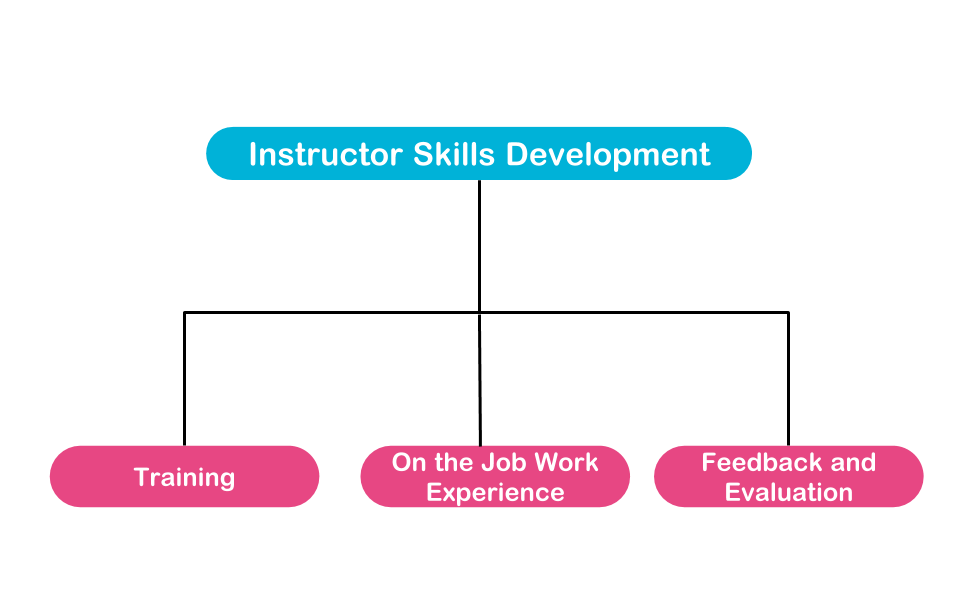4. Develop and Strengthen
How are Future Skills Developed and Strengthened?
The instructor training program involves training to prepare you for delivering great STEM programming, activities and responsibilities performed that enrich your work role, and feedback from colleagues and supervisors. Here we will focus on these three interconnected ways that all network member instructors are introduced to future skills, develop these skills, and strengthen these skills in practice.
Work Experience + Training + Feedback & Evaluation
Together these three elements create - The Actua Instructor Training and Work Experience Program
In this section of the module we will discuss each of these three elements and will focus on how you can begin to correlate and connect your experiences, training and feedback in ways that can be communicated in future job opportunities like interviews, and resume building.
Training + Job Experience + Feedback and Evaluation

Skills Developed through Training
Instructor training occurs at the start of your role and often at the beginning of a programming season such as before Spring workshops, Fall clubs, or Summer camps. The training you will encounter throughout your time as an instructor can be considered valuable to the tracking and connecting of your skills to your readiness for work. If you are applying for a job that emphasizes Problem Solving as an important skill when hiring, you might look back at the various training sessions that helped strengthen your problem-solving skills. Here, we have included a chart that denotes the skills that each training may accentuate.
Activity Two
For this activity, use the Training and Skills Tracking chart in your Future Skills Workbook printout, or use a personal device/notebook to think about the various transferable skills you may strengthen and/or develop as a result of your many training opportunities.
Below is a copy of the blank Training and Skills Tracker chart.
For example - Classroom Management training may also help strengthen your Organization, Social Intelligence, and Communication skills
Skills Developed through Work Experience
Beyond your training, we know that instructors are learning a lot (!!) from your on-the-job work experience. Shifting your perspective in a way that views your work experiences as essential to your skills development is a great way to begin making correlations between your skills and future plans. For example; if you are responsible for packing, storing and keeping inventory of your program’s material closet/storage room this experience may be helping strengthen your organization, reliability, commitment and/or professionalism skills.
We have created a tool that can help you keep track and review the skills you are developing through your on-the-job experience.
Along the left-hand column, there is a long list of many of the tasks and responsibilities that a Network Member program instructor is likely to perform in their instructor role. This can include tasks like “planning and designing curriculum” or “participating in a wide range of training sessions”. Across the top of the chart is a list of the Future Skills as columns going on the right side of the page. Here you can look across the task, and consider which of the future skills you have developed.
Activity Three
In your Future Skills Workbook PDF. printout use this second tracking tool to now consider how the roles and responsibilities that make up your various on-the-job experiences can result in the development of Future Skills.
Below is a copy of the Job Experience and Skills Tracker chart.
For example: Regular inventory and maintenance of the program supplies and materials can connect to the development of skills like; Initiative, Commitment, Organization
- Fill out your copy of the Skills and Work Experiences Tracker.
- Consider three things that surprised you, or you found helpful about this tracking exercise.
Skills Developed through Feedback & Evaluation
During your time as an instructor you should have opportunities to receive feedback from your supervisor, program coordinator and/or director. You will also have formal and informal opportunities to discuss how things are going with your colleagues. Finally, self-reflection and goal setting should be a part of your multi-faceted feedback and evaluation plans as well. By having multiple opportunities to receive feedback you have several contexts in which to reassess and make changes. This can certainly contribute to performance, and skills development and strengthening.
Viewed 4,025 times